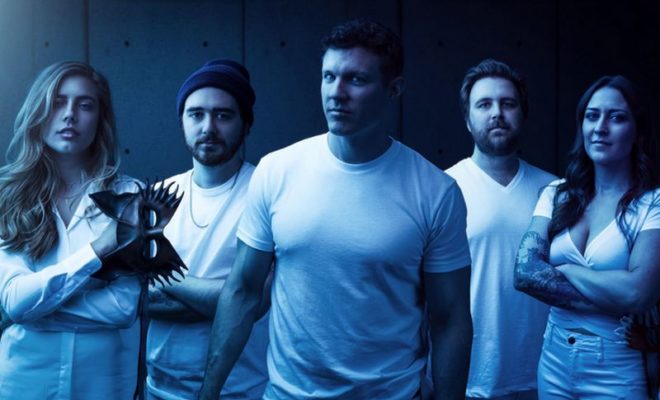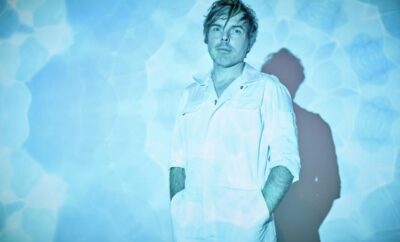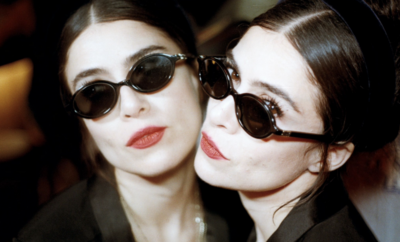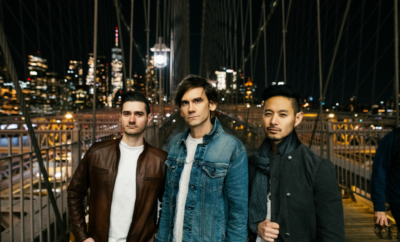
Interviews
Blackout Balter – Animal
By: Jamie Steinberg
Q) How would you describe your sound?
A) I really feel like our sound is 2020. We’re melodically-driven, alternative rock music, with an edge. I think the rock world is overdue to have another band that serves as a gateway for fans to discover the underground and I hope we’re that band. In the early-90’s that was Nirvana; in the early 2000’s that was The White Stripes, The Strokes, The Killers. The industry is overdue for another rock and roll gateway drug, so-to-speak. I want our band and our sound, to be this gateway.
Q) Who are some of your musical influences?
A) When I was fifteen years old or so, my cousins exposed me to hard core punk rock. At the time, Nirvana was my band. Like many other kids, Nirvana compelled me to learn guitar and taught me some important lessons about simplicity in songwriting while focusing on melody over storytelling and injecting a certain level of attitude into your music. And then came Black Flag and other music from the true late-70’s, early-80’s hard core punk scene and it all made sense to me: attitude and passion were more important than technique and technical proficiency. I didn’t need to be a perfect instrumentalist–I just needed to create. The hardcore movement got me interested in the founding of punk rock, to include The Stooges, Velvet Underground, New York Dolls, The Ramones, and others from the New York CBGB scene. The Sex Pistols and, of course, Bowie–the list just goes on and on. I was fascinated with this new and exciting world of punk rock music that I had discovered. It wasn’t just about the music; it was about living life on your own terms and doing what you want to do. And I’m still on that train today. Other big influences for me are Elliott Smith, early-Weezer (the Blue album and Pinkerton), Pavement, The Pixies, Mason Jennings, The Who and, of course, The Beatles. I’m all over the map! [laughs]
Q) Talk about the story behind your new song “Red Letter.”
A) Our songs don’t usually contain stories, per se–they contain feelings and emotions, and I work hard to shape the feelings and emotions a song conveys. That’s my approach to songwriting. As such, “Red Letter” is sort of a comment on letting fame get in your way and driving one to get soft and forget what’s most important in life. Unfortunately, this sort of thing happens with bands all the time, and I just don’t understand it. Music is one of the only art forms where so-called artists write one good song and then just go dark for the rest of their lives. Does this happen in the artistic disciplines of writing or illustration? Not really–not like it does in music. So why is that? I have a lot of strong opinions about this and I wanted “Red Letter” to represent my feelings around this general topic. On a more conventional note, I really like the line “Oh, Radio–take me,” as it speaks to music’s power to take us away from this crazy world for a few minutes, as in “losing ourselves in the music.” This is a nostalgic feeling to me.
Q) What do you think it is about the song that fans connect to?
A) [laughs] Well, I hope fans connect to it! We’re still virtually undiscovered. I wish we weren’t, but that’s the truth. Maybe someday thousands and thousands of people will be connecting with our music. When that day comes, and I really hope it does, maybe I’ll be able to give you a better answer; but that’s not why we write music or make art. Our songs are important to us, as a band, and they’re important to me, personally. So, when we throw a song out into the world, it’s real; it’s authentic; it’s really us. If people do connect with our music, I’m guessing they can sense a little piece of that authenticity. I also really like the melodies within “Red Letter,” so I’m guessing some people may connect on that level as well.
Q) How does the video for the track play into the message behind it?
A) We took more of a literal approach when writing the script for the video, so it’s not so much tied to the root idea behind the song, though I do think there’s a close tie between the video and track on an emotional level. We wanted to do a single-camera, one-shot video of a guy (me) walking through his house, encountering strange creatures–in this case animals or people wearing animal masks. These animals represent a bunch of things, to include our internal demons so-to-speak, sort of pushing all of us along in various ways. I think it’s a cool visual accompaniment to the song and I think it portrays the emotional aspect of the song correctly. As a side-note, I found out how challenging a single-shot scene really is to create. It takes a lot of planning and it’s really difficult! [laughs]
Q) How did you select it as the first single off your upcoming album?
A) I think “Red Letter” does a good job of representing our sound. It’s an in-your-face rock song with a solid melodic structure. We actually did an acoustic version of this song at a Paste Magazine in-studio session a few years ago, so I was personally excited for our fans to hear the real version that’s been kicking around in my head. It just seemed right for Red Letter to be our first single.
Q) What is your song writing process? Do you need music before you can create lyrics?
A) I really love these questions because there are a number of different approaches one can take to write a song. But, for me, I usually start at the melodic level, then back into a chord progression and then focus on the lyrics. In fact, for me, the melody informs the lyrics, not the other way around. It wasn’t always this way. When I started writing songs, I would find a cool guitar chord progression and then work on the lyrics, but now it’s much more of a higher-level, melody thing for me. I’ve found that I can capture some really interesting melodies by just listening to my surroundings, or even just by taking time to think in a quiet place. And once you capture an important melody, you can use that as the foundation of a song. For me, this sort of magic usually happens in the morning, when my head is clear. I feel like I’m oversimplifying things a bit here. [laughs] In reality, it usually takes me at least a few months to finish a song. It’s a long process for me and I feel that it’s worth the time and effort. Songwriting is almost like putting together a very difficult puzzle, to me.
Q) How much of a hand do you have in the production of your music?
A) A lot. [laughs] But, to be honest, I’d like to have less of a hand in it. I usually go into the studio with the songs almost fully worked out, but in the future, I’d like to really push our producers to use their own creativity even a bit more. At the moment, I’m writing some very synth-heavy songs with sort of a dark-pop feel to them. I’m a rock guy, so for us to interject that dark-pop feel into some new music we’re really going to need to rely on some outside production help. [laughs] The question to me is: How can you get the music you hear in your brain, out of your brain and into the world? Sometimes you can figure that out yourself, but sometimes you need some outside help. I co-produced the current album “Animal” with Jeremy Ferguson because we knew he had the rock chops to pull off the alt-rock vibe we were going for. I think we hit it on the nose.
Q) What are some themes you explore on your new album Animal?
A) Love, loss, leaving, struggle, perseverance, but–maybe most importantly–an attitude and commitment to do what you want to do in life. To break away and be free. I think all of these things are represented pretty well throughout the album. I know most people don’t listen to entire albums, all the way through anymore; but if someone listened to Animal from start to finish, I think they’d feel as if they were on a journey with ups and downs–struggle and perseverance. In fact, if you were to only listen to the first and last songs of the album (“Red Letter” and a song called “Bear”), you’d probably get a sense of this journey. This album is a long one: 14 songs. And I really think each of these songs is important, in its own right.
Q) Who would you most like to collaborate with on a song in the future?
A) Iggy Pop. He’s a total legend, and I’ve heard he’s a really nice guy, too.
Q) What album/band are you currently listening to and why do you dig them?
A) I’ve been listening to Mattiel and Caroline Rose a bunch recently. They’ve got attitude and passion and I like their songwriting, too. I’ve also been listening to The Oblivians. They’ve got a song called “Bad Man” that is just amazing to me.
Q) You are a part of social media. Why is that such an important way for you to connect with your fans?
A) Well, I wish we were better at the social thing [laughs], but it definitely is important. Our management, or some outside agency, doesn’t manage our social accounts for us–we actually do it ourselves. So, when fans receive responses from our account, they’re actually receiving responses directly from the band. I think that’s really cool to have a direct connection to our fans in this way. Before we were playing music professionally, I would have loved it if one of my favorite bands actually texted me [laughs].
Q) What would you like to say to everyone who is a fan and supporter of you and your work?
A) We really care about you. We really, really care. We appreciate your taking a chance on us. We’re an independent band and we know there’s a risk that fans take when they tell their friends about us. But it’s this risk that really makes us feel close to our fans at this stage in our careers. We’re still early in the game and early fans deserve credit, as we continue to build our name. We won’t forget the early fans. I promise.
All Questions Answered By Vocalist/Guitarist Philip Cohen





You must be logged in to post a comment Login